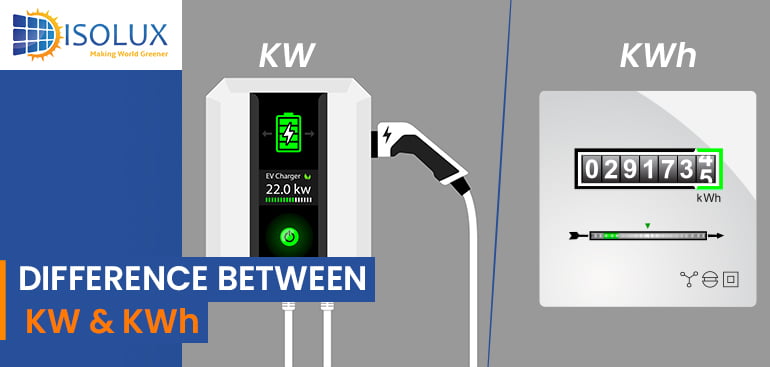Understanding the basics of energy and power can be confusing, especially when it comes to terms like kW (kilowatt) and kWh (kilowatt-hour). If you’re considering solar panel installation, knowing the difference between these two terms is crucial for making informed decisions about your energy consumption and savings. Let’s break down the difference between kW and kWh in simple terms to help you understand how they relate to your home or business’s solar energy system.
What is a Kilowatt (kW)?
A kilowatt (kW) is a unit of power that measures how fast energy is used or produced. Think of it as the “rate” at which electricity flows to your appliances.
1 kW = 1,000 watts
For example, if you have a 1 kW solar panel system, it can produce 1,000 watts of power at any given moment when the sun is shining.
Common Examples of Power Usage in kW
1. A standard air conditioner might use around 2-5 kW of power.
2. A washing machine typically uses about 0.5-2 kW while in operation.
3. A microwave could use about 1 kW of power.
What is a Kilowatt-Hour (kWh)?
A kilowatt-hour (kWh) measures the amount of energy consumed or generated over time. It represents the total amount of electricity used. If you leave a 1 kW appliance running for one hour, it will use 1 kWh of energy.
In other words, while a kilowatt (kW) measures the “rate” of power at a specific moment, a kilowatt-hour (kWh) measures the total amount of energy used over time.
Examples of Energy Consumption in kWh
1. A 2 kW air conditioner running for 5 hours will consume 10 kWh of energy (2 kW × 5 hours = 10 kWh).
2. A 1 kW microwave used for 2 hours will consume 2 kWh of energy (1 kW × 2 hours = 2 kWh).
3. A 3 kW solar panel system producing energy for 4 hours will generate 12 kWh of energy (3 kW × 4 hours = 12 kWh).
Key Difference Between kW and kWh
To summarize, the difference between kW and kWh is like the difference between speed and distance:
1. kW (Kilowatt): Measures the rate of power generation or consumption at a given moment.
2. kWh (Kilowatt-hour): Measures the total amount of energy used or generated over a period of time.
How kW and kWh Relate to Solar Panels
When considering solar panel installation, understanding how kW and kWh work together is essential for calculating your energy needs.
1. Solar System Size in kW: The size of your solar system is usually measured in kilowatts (kW). A 5 kW solar panel system, for example, can produce 5 kW of power at peak sunlight.
2. Energy Output in kWh: The total energy that the solar system produces is measured in kilowatt-hours (kWh). The amount of kWh your solar panels generate depends on factors like the size of the system, the number of sunlight hours, and the efficiency of the solar panels.
Example:
A 5 kW solar system can produce around 20 kWh of electricity per day (assuming about 4 hours of peak sunlight per day in Sydney).
Knowing your energy consumption in kWh will help you determine the right size of the solar system for your home or business.
Also read: Solar Panel Size Australia
Why Does This Matter for Sydney Homeowners?
Understanding the difference between kW and kWh is crucial for Sydney residents when calculating their solar energy needs. For example, knowing how many kWh your household uses per day will help you determine the size of the solar panel system required to meet that demand.
For residential and commercial properties in Sydney, solar panels are a great way to reduce electricity bills by generating your own energy. The goal is to match your solar system’s kWh output to your home’s energy consumption, ensuring maximum efficiency and savings.
How Isolux Solar Can Help
At Isolux Solar, we specialize in designing and installing solar panel systems tailored to your specific energy needs. Whether you require a small residential system or a larger commercial setup, we’ll help you determine the appropriate size in kW based on your current kWh usage. Our expert team ensures that your system generates enough kWh to cover your daily energy consumption, maximizing savings on your electricity bills.
Conlusion
The difference between kilowatt (kW) and kilowatt-hour (kWh) may seem technical, but understanding it can make a significant difference when choosing the right solar system for your needs. Simply put, kW is the rate of power, while kWh is the total energy used or generated over time. For Sydney residents considering solar installation, having this knowledge can help you make more informed choices about your energy consumption, system size, and potential savings. Ready to switch to solar and start saving on your electricity bills? Get a free quote from Isolux Solar today to find out how we can help you harness the power of the sun for your home or business.




